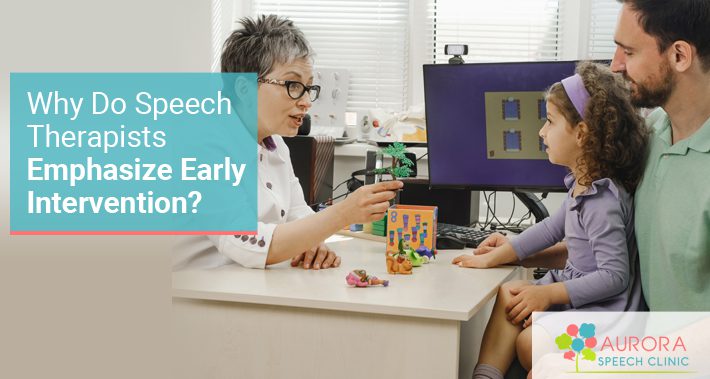
When it comes to pediatric speech therapy, you’ll frequently hear speech-language pathologists emphasize the idea of “early intervention.”
From birth to age three, a child’s brain is making one million neural connections per second.
Further, a child’s brain will develop more in the first five years of their life than it will the rest of their life combined.
As children grow, they learn to move beyond their primitive reflexes and develop control over their body.
They begin to crawl, roll, sit up, and eventually walk.
Their fine motor skills will develop significantly in early childhood too.
This includes learning how to hold objects, using a spoon and fork, learning to write, and much more.
Of course, a child’s communication skills develop substantially during infancy and early childhood as well.
The ability to communicate effectively is fundamental to academic and social success and emotional well-being.
As such, when a child faces challenges with their communication skill development, early intervention is paramount.
In this article, we explore the significance of early intervention in pediatric speech therapy and its lasting impact.
What Is Early Intervention?
Early intervention refers to the timely and proactive identification and intervention of developmental challenges or delays in children during the critical stages of growth.
This is typically from birth and throughout the preschool years.
Children with delayed motor skills, for example, may benefit from early intervention from a pediatric occupational therapist.
Children demonstrating delays or difficulties related to communication may benefit from intervention from a registered speech-language pathologist.
RELATED: Speech Therapy For Developmental Delays
The goal of early intervention is to provide specialized assistance at the earliest possible stage.
This helps to take advantage of the remarkable plasticity of a child’s developing brain and aims to mitigate or prevent potential long term issues.
Early intervention also empowers caregivers with the knowledge and tools needed to actively participate in the child’s progress.
It is a collaborative effort involving speech therapists, parents, caregivers, and other professionals to create a supportive environment that fosters optimal growth and well-being in children.
But why is early intervention so important?
Let’s take a closer look.
1. Developmental Milestones and Early Signs
Children reach various speech and language developmental milestones as they grow.
These milestones serve as guidelines for gauging your child’s progress.
However, some children may exhibit delays or difficulties in reaching these milestones which may signal the need for speech therapy.
Common early signs include limited vocabulary, difficulty combining words into sentences, and difficulty understanding or following directions.
Identifying these signs at an early age allows for timely intervention, thereby minimizing or preventing potential long term challenges.
2. Neuroplasticity
Neuroplasticity refers to the human brain’s remarkable ability to reorganize itself.
This allows it to function in a different way than it did previously.
It is, quite literally, what allows us to learn and grow.
Neuroplasticity remains for one’s entire life, but the human brain is most plastic in early childhood.
This is when we are most adaptable to new experiences and learning.
This period of enhanced neuroplasticity is particularly crucial for communication development.
It’s one of the reasons young children can easily learn multiple languages and can do so with a native accent in each.
Early Intervention helps your child’s brain reorganize and develop alternative pathways for effective communication.
The younger the child, the more receptive their brain is to positive changes, making early intervention a strategic approach.
3. Social and Emotional Implications
Effective communication is the cornerstone of social interaction.
Children with communication challenges may experience frustration and isolation.
Early intervention in speech therapy not only addresses these challenges head on but also fosters social skills, enabling individuals to connect with others and build relationships that are essential for overall well-being.

4. Academic Success
Speech and language skills are foundational to academic success.
Children with strong communication skills perform better with reading, writing, and overall academic achievement.
Early intervention in pediatric speech therapy can significantly improve your child’s academic trajectory.
It’s important to address speech and language challenges before they become obstacles to learning.
This proactive approach helps make sure your child enters school with the communication skills they need to excel in various subjects.
5. Prevention of Compounding Issues
Speech and language difficulties, if left unaddressed, can lead to compounding issues.
As your child progresses through different stages of development, challenges in speech and language may impede the acquisition of more advanced skills.
Early intervention serves as a preventive measure, addressing issues before they become entrenched and affect multiple aspects of a child’s life.
By identifying and addressing speech and language challenges early on, you can mitigate the risk of compounding developmental issues.
6. Support for Families
Early intervention in pediatric speech therapy not only benefits your child, but also provides essential support for your family.
Parents and caregivers play a crucial role in a child’s language development.
Your speech-language pathologist will work collaboratively with your family to provide strategies and activities that can be integrated into daily routines.
This partnership empowers you to actively participate in your child’s speech therapy, creating a supportive environment for continued progress.
7. Cost Effectiveness in the Long Run
Investing in early intervention in pediatric speech therapy is not only beneficial for your child’s development, it’s also more cost effective in the long run.
Addressing speech and language challenges early on reduces the need for more extensive interventions later in life.
By preventing or mitigating developmental delays during the critical early years, we reduce the likelihood of long term therapeutic and educational interventions.
Ultimately, this saves financial resources.
8. Long Term Impact on Quality of Life
Perhaps the most significant aspect of early intervention in pediatric speech therapy is its lasting impact on your child’s quality of life.
Effective communication skills open doors to opportunities, relationships, and personal fulfillment.
The ability to communicate is an invaluable skill that can shape the trajectory of your child’s future.
Book Your Appointment With Aurora Speech Clinic Today
Have you noticed that your child is not meeting their developmental milestones?
Are they not able to communicate the way you expected?
If so, we encourage you to consult with a registered speech-language pathologist.
Rather than the “wait and see” approach, at our speech therapy clinic, we prefer the “well, let’s see” approach.
Book your appointment with Aurora Speech Clinic today.
372 Hollandview Trail, #302,
Aurora, ON L4G 0A5
(905) 503-4321
» https://goo.gl/maps/fg3XKnNsczzwLzTz7
Aurora Speech Clinic is located in Aurora, ON and offers personalized skilled intervention to those struggling with their speech and language skills. Services offered include screening, consultation, and comprehensive evaluation. We also provide one-on-one and/or group therapy for speech sound disorders, receptive/expressive language delay/disorder, stuttering/cluttering, accent reduction, and much more.